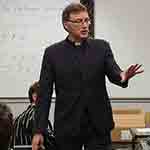
This is from an article, written by me, which first appeared in our diocesan magazine Anglican Life (August-September 2017).
Part 1 (which I recommend you read first) challenges a common image of God and prejudices about the nature of truth.
There is another aspect of spirituality and theology that I think we need to renew and press to this task with young people. To introduce my point, I remind you that our western church emphasises what is called the cataphatic tradition: “God”, we say, “is like this”, only bigger, better, brighter. “God is loving”, like we are, but “all loving”. God is powerful, like we are, but God is all powerful— omnipotent. God is omniscient— all knowing. And so on.
There is another side of the coin, more prevalent in the East, including in Eastern Christianity. This is called the apophatic tradition. It says, “God is not like this, or God is not like that.” This is the aspect that I think we need to put more energy into.
Now and then, we are reminded of the apophatic. The well-known nineteenth-century hymn by Walter Smith begins:
Immortal, invisible, God only wise,
In light inaccessible hid from our eyes,…
Unresting, unhasting, and silent as light,
Nor wanting, nor wasting, Thou rulest in might.
In the West, this apophatic approach can be traced through Augustine, Thomas Aquinas, Meister Eckhart, the Cloud of Unknowing, Denis the Carthusian, and John of the Cross. The apophatic was most startlingly affirmed by the Western Church in the teachings of the Fourth Council of the Lateran (in 1215). This, one of the greatest western ecclesiastical gatherings in the Middle Ages, agreed God is “eternal and immeasurable, almighty, unchangeable, incomprehensible, and ineffable.” Canon Two of that same council includes the startling assertion that “between Creator and creature no similitude can be expressed without implying a greater dissimilitude.” Whatever image, metaphor, or adjective we apply to God—this council is teaching—however appropriate we might deem the concept to be, it is more false than true.
There is a level of awe and mystery in apophatic understanding that young people can see themselves growing into rather than simply out of. We are acknowledging the inadequacy of language when we speak of the mystery we call God. All language about God is inadequate. The language that we do use, we hope, is the least inadequate. In this approach, signs and symbols (and sacraments) come into their own, as does the realisation that we are not simply believing six impossible things in our heads before breakfast. We are committing our lives, entrusting ourselves to the great Mystery at the heart of Reality.
Continue to the conclusion – Part 3
If you appreciated this post, do remember to like the liturgy facebook page, use the RSS feed, and sign up for a not-very-often email, …
photo by: Melissa Hogan




Apophasis may also be particularly attractive to young people, I think, because they may come to realize that some valid “agnosticism” exists within the Church. Their popular (mis)perception is that the Church claims a kind of univocal Truth, to “have all the answers.” Apophatic statements give them permission to–as you say–“grow into” faith rather than take it fully formed from an authority figure.
Yes, Andrew! In a sermon to the school recently, I told the story of a wonderful debate with a Year 12 student – an atheist – who said to me, “What is so annoying is that you people who believe in God are always so sure that your image of God is correct.” My response to him: “Let me be clear – I am sure that my image of God is incorrect.” Blessings.
Thanks, Fr. Bosco. You must be a fan of RS Thomas as well?
I wish I had (made?) more time for such to raise my interest to “fan” status, Andrew 🙂 Blessings.
I can’t tell you how much I would’ve appreciated being taught about the apophatic traditions in high school. I’m only just starting to explore them now.
Thank you for writing this.
Thanks for the encouragement, Timo. It’s great you have found them. Blessings.